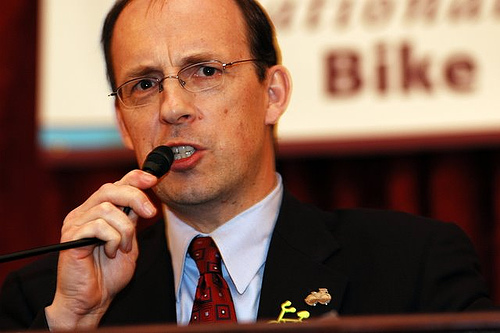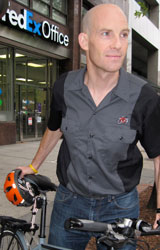Don’t Call It a Merger: America’s Big Three Bike/Ped Advocates Join Forces
1:42 PM EST on February 28, 2012
Last week, three leading organizations advocating for biking and walking issued a communiqué [PDF] about their intention to unify. According to the plan, hashed out two weeks ago at a top-level meeting in San Diego, the League of American Bicyclists, the Alliance for Biking & Walking, and Bikes Belong will become one organization, with one board of directors.
Streetsblog spoke with Andy Clarke, president of the League of American Bicyclists, and Jeff Miller, president of the Alliance for Biking & Walking, about what the merger will mean for the movement. To begin with, Clarke said it wasn’t a “merger” but a “unification.”

Andy Clarke: A “merger” suggests that one or two organizations are being subsumed by or merging into one of the others, and that’s really not what we’re doing here. We are unifying three organizations and creating a new organization together. All three organizations are in good shape and we’re realizing that we could do even more together.
This isn’t a case where one of us is faltering or one of us wants to take over the other one. This is not a hostile, commercial-style corporate takeover. We’re not at odds on any issue of policy or strategy or anything like that, but inevitably, because you’re different organizations, there are institutional things you have to work around. We’re three organizations that work together well, that are all thriving and doing well, realizing we could do even more if we remove some of the boundaries or barriers that exist naturally because you’re part of different organizations.

Tanya Snyder: How are they going to maintain their own identity?
Jeff Miller: They’re not.
TS: They’re not?
JM: We are all going to feed into and become this new organization. And each of our existing organizations will most likely fade away. There are a lot of details to be worked out, and of course ratification by our boards, but if all goes well, we’ll create this new organization which effectively will inherit the good programs of each of our organizations which all of us want to see move forward: the Bicycle Friendly America program, Bikes Belong’s Green Lane Project, the Safe Routes to School – the National Partnership is absolutely going to be continuing forward -- the Alliance’s work around capacity-building, the trainings and retreats and the benchmarking report are all going to be continuing forward under the tent of this new organization.
AC: So, there only will be one set of logos on [the bike racks in front of the building where the League, the Alliance, and America Bikes have their offices].
We want to be able to use the reach of the People For Bikes list of 500,000 people that Bikes Belong has, marry that with the policy-wonking that we do at the League office, with the incredible grassroots network that the Alliance manages, and not have to worry about which group gets the credit, or who goes first with the action alert, or who writes the press release that gets picked up by Streetsblog. We don’t need that kind of organizational inefficiency. We need to cut through that and get on with our job leading the bicycling movement.
TS: But the League has been around for –
AC: Your question is about the history and tradition and how we keep that alive. That is part of what we desperately want to do. That continuity with the 132-year history of the League is important to all of us.
The League of American Bicyclists does business as the League of American Bicyclists, but we’re still the League of American Wheelmen. You wouldn’t pick that name if you were starting a brand new organization today, because it’s somewhat rooted in the history of the time. But you don’t want to lose that connection back to that incredible story. We’d be fools to throw that away, but equally we’d be fools to try and get people in the future to join the League of American Wheelmen.
But we could still be the League of American Wheelmen but be doing business as this new entity. We could keep the League of American Wheelmen as one program element. We could have the League of American Wheelmen’s legal defense fund as a project of this new entity.
So we’ve shied away from saying that the League, the Bikes Belong Coalition, the Bikes Belong Foundation, or the Alliance will be dissolved because we don’t know yet if that’s the right step to take.
TS: Obviously the bicycling movement is very concerned right now about the transportation bill – both versions of the bill would be devastating for cyclists. I’m assuming this new entity is part of the strategy for moving forward in a post-dedicated-federal-funding world. What is the strategy going forward, once dedicated federal funding is out of the picture (at least for the next eighteen months to six years)?
JM: There is a lot of writing on the walls that there is going to be some devolution. Certainly there is the possibility that there won’t be any federal funding. But we’re still fighting like hell, and I don’t think any of us want to consider that fully yet.
But regardless, there is an incredibly important role at the state and local level. That’s where the decisions are made. That’s where the money is spent. And it’s also where the vast majority of the money comes from. If you look at the state and local funding that goes into transportation infrastructure, it dwarfs the federal funding.
So there are a lot of opportunities for us. And some of our organizations at the state and local level have been playing that game and working it really well and making a lot of improvements.
So one of the things that the Alliance’s leadership is excited about, with this unification, is the focus of this new national organization on working with and dedicating significantly more resources to state and local organizations.
TS: So the state and local piece will become more central, post-transportation bill (if there ever is such a thing)?
AC: You’ll see from the program of the National Bike Summit. We’ve got workshops that are focusing on if, in the worst case scenario, we do lose dedicated funding, there’s a session on how the cycling movement can participate in the elections in 2012. There’s a workshop on what we can do, and what is already being done, to preserve funding levels through state action. There’s a workshop focused on how to be more effectively organized at the state and local level to keep the momentum going.
We’re already well aware of the need to not be completely focused exclusively on the federal level and of the value of having a strong state and local constituency. That’s always been true. We’ve always benefited from an incredible grassroots organization and voice that we’ve got. We’ll just see how much more effectively we can organize that.
My suspicion, if I had to guess now, is that you’ll see a membership-based organization emerge from this that supports a national effort, but where we meet people is very much at the local level, whether that’s through a recreational riding club or a local advocacy group or a mountain bike trail crew or a local bike shop. That’s where most people get their experience of cycling; that’s where most people get engaged or involved in the cycling movement.
We need to make sure people at the local level can find a quick and easy way to plug into the movement and have their voices heard. And I think we can do that better, more proactively, with the three organizations working together.
TS: Even if this would be a smart thing to do, it’s hard for organizations to just will themselves out of existence. Is there any voice of opposition here?
JM: I’ve had a few organization leaders share some concern – they’re concerned about the cultures of our organizations and how different they are.
TS: How are they different?
JM: The thing I hear highlighted from some local leaders is that they see and appreciate and really value the ground-up role that the Alliance plays. We exist solely to serve these state and local organizations. My board is made up mostly of leaders of local organizations. They know they have a voice with us.
And there may have been times when our partners may have been a little more top-down. So there’s that concern I’ve heard a few people raise. But most people are really psyched. They see the opportunities for improved efficiency and communication.
I think we really have to prove ourselves, particularly to state and local leaders and partners on the ground, of the value that we can bring and the support and resources that we can provide. And it may take a year or two or three to do that effectively. But it is very much my hope that we will prove ourselves worthy as partners and allies and that a couple years from now we will look back and realize what a transformational move this was.
UPDATE 8/16/12: The three organizations have announced that they've decided not to merge after all.
Stay in touch
Sign up for our free newsletter
More from Streetsblog USA
Friday’s Headlines Got Served
Another day, another GOP lawsuit trying to overturn a Biden administration climate change rule.
Disabled People Are Dying in America’s Crosswalks — But We’re Not Counting Them
The data on traffic fatalities and injuries doesn’t account for their needs or even count them. Better data would enable better solutions.
LA: Automated Enforcement Coming Soon to a Bus Lane Near You
Metro is already installing on-bus cameras. Soon comes testing, outreach, then warning tickets. Wilshire/5th/6th and La Brea will be the first bus routes in the bus lane enforcement program.
Talking Headways Podcast: Charging Up Transportation
This week, we talk to the great Gabe Klein, executive director of President Biden's Joint Office of Energy and Transportation (and a former Streetsblog board member), about curbside electrification.
Why Does the Vision Zero Movement Stop At the Edge of the Road?
U.S. car crash deaths are nearly 10 percent higher if you count collisions that happen just outside the right of way. So why don't off-road deaths get more air time among advocates?




